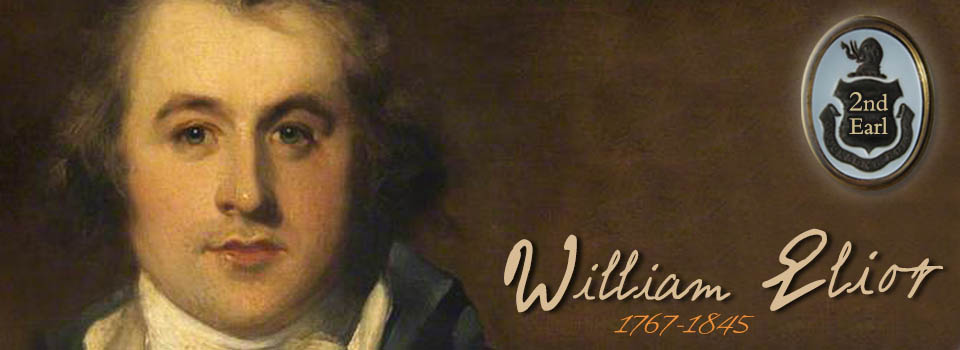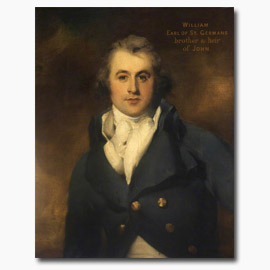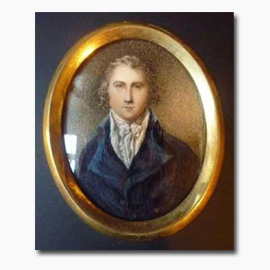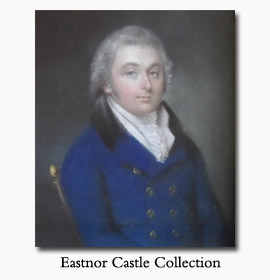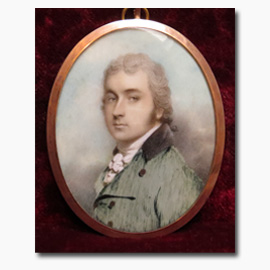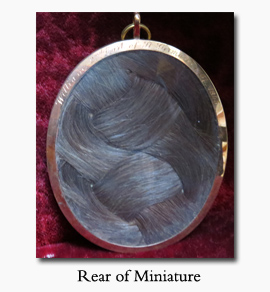William Eliot, 2nd Earl of St. Germans (1767 - 1845)
William was the fourth child and fourth son of Edward Eliot and Catherine Elliston.
William was born at Port Eliot on the first day of April in 1767 and baptized four days later at St. Germans. As a boy, he followed in the footsteps of his two older brothers and attended Liskeard Grammar School. On 23 Sep 1784, he entered Pembroke College at Cambridge (again, like his brothers), receiving his M.A. just two years later. No personal details of his youth have come down through the ages, so this biography necessarily picks up with William nearly five years out of school and standing for election. It's probable that he had been sent during these missing years to the continent for training in languages and deportment, as the first three years of his career were spent in Berlin – appointments which would have required a decent command of the German language.
Although nine years the younger, William was "deeply attached" to Edward James, his brother who was already established in a successful political career. Like this brother, William was destined to enter the political realm and was groomed for a diplomatic career. (As his father's favorite son, William was to realize the career for which Edward Eliot had always secretly yearned.) At the age of 23, the son was returned (by his father, of course) for the seat of St. Germans in January 1791 (a seat he would keep for the next eleven years). That same summer, William went abroad to serve an apprenticeship at the British embassy in Berlin and was commended by his superior for "sound judgment and capacity". This led to a royal appointment in the Berlin office as Secretary of the Legation during the 1791-93 period, for which "the Hon. Mr. Eliot kissed the King's hand", and where Sir Morton Eden found him to be "perfectly accommodating" in the post "but too silent." In August of 1793, William became the Secretary of Embassy to the Hague, as well as the Charge d'Affaires at Berlin. Eliot's father was very pleased with his son's advancement and wrote to William Pitt that the position was "very near my heart".
While Edward may have rejoiced in the continental appointments, William yearned for the "green and pleasant land" of England. In 1796, 29-year-old William was offered a post in Constantinople but refused it. This decision was heartily supported by his older brother, Edward James, who wrote to his father, "I approve very much of William's not going to Turkey. The other obstacles and inconveniences might, I believe, have been smoothed off, but the distance certainly never could." Instead of the post in Turkey, William was sent back to Germany as the Envoy to Munich, later the same year becoming the Minister to Elector Palatine and Diet of Ratisbon (a position which he kept through the 1798 season).
Apparently, William's diplomatic career offered ample opportunity to visit England. By 1797, William was engaged to marry the fair Lady Georgiana Leveson-Gower, daughter of Lord Stafford. They planned a wedding for the end of September, but tragedy struck the Eliot family just days before the intended marriage which necessarily postponed the happy event. William's elder brother, Edward James, died at Port Eliot on the seventeenth of September, his funeral taking place nine days later. William was "at Trentham" (the home of Lord Stafford), preparing for the upcoming nuptials and ironing out details in the Marriage Settlement, when he received word of this much-loved brother's death. It would be two months before the couple stood before the Bishop of Carlisle at her parish church (St. Michael & All Saints, Trentham), on 30 Nov 1797, and vowed to "love, comfort and honour" each other. This union was blessed with four children: one son and three daughters.
While William's parliamentary career spanned a period of more than twenty years, he was not particularly interested in politics, other than as a means to an end. He owed his various positions to family connections, certainly not to any pretenses of political genious. As a staunch supporter of William Pitt, he adhered to Pitt's opinions in every vote, and this carried him far. Lord Staffordn worried about his new son-in-law's financial security, asked Pitt to grant a post of "Groom of the Bedchamber" to William. Instead, Pitt secured a better-paying position for him (in July 1800) as one of the seven Lords of the Admiralty, a post that paid £1,000 per annum. The salary certainly aided William and his growing family, but he held this post almost in name only, contributing little to the work of the Board. William desired to resign in 1801, when Pitt resigned as Prime Minister, but his friends convinced him to remain in his post and continue to vote the Pitt way. Due to William's many absences from the House, however, plus the fact that he continued to vote with Pitt (in opposition to the Administration which he was serving), he was successfully pressured by Addington to resign from the Admiralty board in January 1804. His seat in the House of Commons was secure, though, where he remained true to his alliance with Pitt.
The reason for William's frequent absence from the House was his wife's deteriorating health (which had never been good), and they spent most of their time in Madeira. William moved his family quite often, in an effort to cure Georgiana's illness. Winter in England was detrimental to what little health she had, so they often went abroad to places that offered a milder climate. The warmer months brought them back to England, closer to family and William's political work. In February 1804, the family was living at a house at Penryn in Cornwall, some 54 miles from St. Germans and Port Eliot. It was here that they received the sad news that Edward Eliot had died "after a few days' illness". William immediately set out for Port Eliot to be with his grieving mother, but – just six days after her husband's death and while her son was yet there – she succumbed to the same illness (an "inflammation of the chest"). William "supported his double loss with great resignation" and prepared a double funeral for his parents, to take place on the first day of March of 1804.
Three months after his parents' deaths, William was appointed as under-secretary to Lord Harrowby at the Foreign Office; once again, however, illness prevented him from carrying out his duties. In December of 1804, William and his family contracted Scarlet Fever, causing him to resign his post. The family escaped the hand of death, and, by July of 1805, William was mentioned as a likely candidate for the post of Secretary to the Treasury.
This was one more post which William was destined to pass over, and 1805 found the family back in Madeira, once again seeking a cure for Georgiana's ill health. God had different plans for them, though, and, in February 1806, William wrote a melancholy missive to his mother-in-law back in England, telling her that they were forced to accept the fact that his wife's illness was fatal. On March 24, 1806, just days before her thirty-seventh birthday, this God-fearing wife and mother died, leaving behind four small children, ranging in age from three to seven years. William wrote home to say that he was in poor health himself at the time and was forced to remain on at Madeira. Several weeks later, father and children sailed for England in the ship that carried Georgiana's body home for burial in the Eliot family vault at St. Germans. William remained close to his sister-in-law, the Duchess of Beaufort, and wrote to her quite often. In early July 1806, just two months after his wife's death, William shared a story with her about Georgiana's last moments, saying, "I know not that I ever experienced more delight than hearing the other day the song in the Messiah, O Death where is thy sting? They were nearly the last words I heard her speak. The Music overpowered me & I was obliged to leave the company, but I would have given anything to have remained."
How difficult it must have been for William to return to politics. Needs must, however, and Portland's rise to power in 1807 brought with it Eliot's appointment to the office of Lord of the Treasury. His votes on major issues were recorded, but he was reported to have been "considered as one of the perfectly inefficient members" of the Board.
Once again, needs must, and William found a new bride for himself and mother for his still-young children. Almost three years after the death of his first wife, on 7 Feb 1809, William married Miss Letitia A'Court, oldest daughter of Sir William Pierce Ashe A'Court of Heytesbury House in Wiltshire (in which parish church the couple said their vows). Joy once again presided over William's home, and the children looked forward to the new baby's arrival shortly after the first of the new year of 1810. On January 20, 1810 – less than a year after her marriage – Letitia gave birth to stillborn twins at their London home in Cleveland Court and died. William was heartbroken, and the little children mourned again.
In September of 1811, the year after his second wife's death, William inherited the estate of Trebursey in Cornwall, an old family holding dating back to Richard Gedy, the father-in-law of Sir John Eliot (William's great-great-great-grandfather). The estate included a "dilapidated" manor house, and the testator's will was quite explicit in conditions for inheriting: the dilapidated manor house, outbuildings and offices must be torn down and rebuilt, at William's cost and expense, within five years of the man's decease (and not one day more); permission was granted for the use of timber from the estate property for the purpose of rebuilding and maintenance; and William was required to reside in the house for three months of every calendar year (even listing the few exceptions to this rule which would be tolerated). If William were to break any of these rules, then it would be "as if he were dead" and the next person on the list would inherit. The property itself must have had some value, because – despite these seemingly despotic conditions – William tore down "the old house", built "a large handsome mansion at some distance from the former", and moved his family there to live.
Inefficiency aside, William continued as Lord of the Treasury until January 1812 – just months after inheriting Trebursey – when he resigned and shifted his attentions to the less-demanding family seat for Liskeard. His reasons must have been twofold, for William had already chosen a third bride for himself and mother for his children, Miss Charlotte Robinson (for whom he had only "the tenderest affection"), and the prospect of a new chance at personal happiness must have led him to decrease the demands of his public life. On the seventh of March of 1812, William and Charlotte (twin daughter of Lt-General John Robinson of Denston Hall in Suffolk) "consented together in holy wedlock" at the house of the bride's cousin, the Earl of Powis, in Berkeley Square, London. The happy couple "left for their seat in Twickenham immediately after the ceremony". (This house was owned by the Earl of Powis, not William, and the couple must have been using it for a short "honeymoon" trip.)
Seven or eight months later, the Eliots once again prepared for a small addition to their family circle. Their life together was happy, and – on the 24th of June of 1813 – Charlotte gave birth at their London home in Hanover Square, London. The baby lived a very short time (probably only minutes, but long enough that it was not recorded as a stillbirth). The loss must have seemed almost unbearable to this young family so immersed in mourning, but they could not have foreseen that there was more to the trial than they yet knew. William's faith was tested still further by the loss of this "amiable and benevolent" wife and mother, whose burial plaque records that she survived "her infant only nine days". Charlotte died on the third of July in 1813, and William buried one more wife.
In just seven years, William had buried three wives and three babies. His four children (from his first wife) were now between 11 and 15 years old, and his son was privately preparing for his entry into Christ Church College at Oxford. William's duties as M.P. for Liskeard helped to pass the time, but something much more agreeable must have been on his mind. On 30 Aug 1814, William travelled to Walton Hall to wed Miss Susan Mordaunt, youngest daughter of Sir John Mordaunt of Walton Hall in Warwickshire. (Despair not – while no children ever came from this marriage, the Lord blessed William and Susan with sixteen years of companionship.)
William and Susan appear to have made a quiet life for themselves at Trebursey (in the new mansion house), with an occasional foray into London. While William continued to represent Liskeard in the House until November 1823, his last-known action in Parliament was a vote in December 1819 to support legislation against sedition. It can only be surmised that he spent the time between that last vote and his inheritance of the family earldom in 1823 in more pleasant occupation, such as enjoying his family and working on the Trebursey estate.
In November 1823, William's brother – John, 1st Earl of St. Germans – died, and the title and estate passed to William. This necessitated a move to Port Eliot and the sale of the new mansion house at Trebursey. Resignation of his Liskeard Parliamentary seat ended William Eliot's immemorable political career and the beginning of his years as the "noble earl".
As the new Earl and Countess, William and Susan spent most of their time at Port Eliot. They supported local charities, hospitals, reforms and groups. The Earl of St. Germans was a generous Lord to his tenants, often reducing the rents (if the harvest was poor or less than it should have been) and supplying them with meat and coal every Christmas. William was a devout Christian himself and did much to aid the spread of the Gospel to those living on his estates. He built two churches in poor parishes that could not afford to attend services (even though only two miles away), and chaired the Liskeard branches of both the "Society for Promoting the Enlargement and Building of Churches and Chapels" and the "Society for Promoting Christian Knowledge".
William's social life was certainly a quiet one for a man in his station. Unlike his older brother, the 1st Earl of St. Germans, William did not enjoy hosting and attending lavish parties and balls at London mansions. In fact, only a few "Dinner Parties in High Life" are recorded in the newspapers as having been hosted by the Earl and Countess at their London house on New Burlington-street. They did enjoy the Plymouth Regatta, where William acted as one of the Stewards, and Susan was the patroness of the Grand Dinner and Ball on the evening of the event, but their time seems to have been better spent than the "high life" so revered by the gentry of their time.
The year of 1830 dawned on the Earl and his family and found them immersed in the joys of daily life: William and Susan were engaged in their many philanthropic activities, 31-year-old Edward Granville was married and serving as M.P. for Liskeard, 30-year-old Caroline was unmarried and living at home, "little Susie" was approaching her 29th birthday and raising her three young children, and 27-year-old Charlotte was still "lying in" after the birth of her third child. During the first days in February, Lady Susan planned a short trip to visit her sister and brother-in-law at Fulford Park in Devon, just 60 miles northeast of Port Eliot.
During her visit, on 05 Feb 1830, Lady Susan unexpectedly succumbed to a brief illness of two or three days "to the great grief of her family" and died. William was sixty-two years old and had lived to see four wives buried. He remained a widower for the rest of his life, cared for by his unmarried daughter, Caroline. William stayed active with his charities and organizations, took several trips to the continent, and worked at improving the various strains of livestock on the Port Eliot estate. One of the principal concerns in his later life was the crossing of his estate by the coming railway, but it was an ordeal left for his son to handle.
This man of sorrow had little break from the mourning practices of his time. In 1832, his infant grandson died at Port Eliot, by a sudden "visitation of God". Over the next nine years, four more of his grandchildren died and his two younger daughters buried – one of whom even died at Port Eliot while visiting her father.
In January 1840, a notice in the newspapers reported that the 76-year-old Earl of St. Germans, while touring the "President" steamship with his son and daughter-in-law, fell through one of the hatchways, a depth of about ten or twelve feet. Although he was much shaken by the fall, he was not so seriously hurt as was anticipated, being only confined to his chamber by a severe sprained ankle. By 1843, the Cornwall winters were too much for "the noble Earl", so William and his daughter travelled to St. Leonard's in Kent for the cold months.
William, like his brothers, had been subject to the Eliot "spasmodic attacks" throughout his life. When he was seized with one of these at the beginning of the week of January 12, 1845, nothing seemed seriously wrong, but his condition worsened throughout the week and ended in a full-blown "attack of paralysis". His ever-constant daughter "watched over his couch" for three consecutive nights, until, at twelve-thirty in the morning on Sunday, January 19th, William Eliot joined his wives in Heaven.
William and Georgiana's son, Edward Granville, was Chief Secretary to the Lord Lieutenant of Ireland and residing in Dublin. Edward, heir to his father's title and estate, received the news of his father's death on the morning of January 23rd and set sail for home that evening. According to William's instructions in his Last Will and Testament, the funeral was as simple and private as possible and officiated over by the Rev. Tobias Furneaux of St. German's, a close and personal friend of the family. The procession set out from Port Eliot at eleven o'clock on January 30, with the coffin covered in black velvet and traditional eight pallbearers. As was the custom of the time, only men were present when William was laid beside his first wife, Georgiana, in the family vault. A disintegrating stone plaque on the top of the churchyard vault marks William and Georgiana's final resting place, and a large marble-and-stone wall plaque was erected to the their memory inside St. German's Church.
William, 2nd Earl of St. Germans, was a Christian man of the first order, whose faith in Christ affected all areas of his life and carried him through the inordinate amount of grief which was alloted to him. He was the last of the Georgian-era Eliots and the end of what would come to be called the "old guard". Edward Granville, his son and 3rd Earl of St. Germans, led the family into a very typically Victorian lifestyle.
MILITARY SERVICE
In his younger days, William served in the Royal Cornwall Militia (Fencibles), as had his older brothers, gaining the rank of Ensign in 1792 and rising to Colonel over the next fifteen years.

Three known portraits of William Eliot still hang (or sit) at Port Eliot: a full-size portrait by Sir Thomas Lawrence, a small oval pastel by an unknown artist (though this has not been located for several decades), and a miniature by Samuel Shelley.
Two more portraits of William Eliot have been identified: a small miniature (which appears to be a copy of the Lawrence painting), and a pastel portrait by an unknown artist – one of a pair showing William and Georgiana Eliot (c. 1798).
